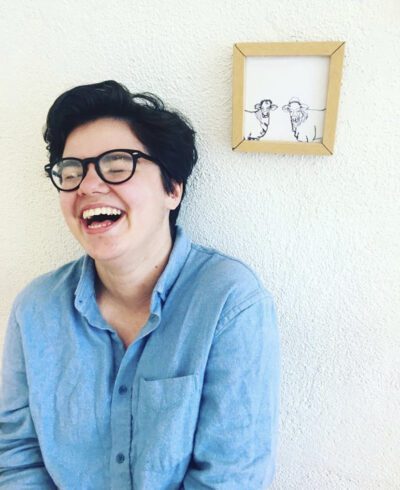Altered Innocence Vol. 2 is the second installment of a collection of LGBTQ and coming-of-age short films. On July 25, Vinegar Syndrome is releasing this collection on Blu-Ray and DVD. Altered Innocence is four hours of content that is split into two distinct blocks of programming. The “Altered” block is for all things strange and boundary-pushing. The “Innocence” program is far sweeter. Together, they create an exciting taste of work from filmmakers all around the world.
The “Altered” program consists of the following short films: Young Diego (dir. Osama Chami & Enrique Gimeno), Yandere (dir. William Laboury), Amfi (dir. Mathias Broe), The Demons of Dorothy (dir. Alexis Langlois), Trade Center (dir. Adam Baran), and Chaperone (dir. Sam Max).
Altered
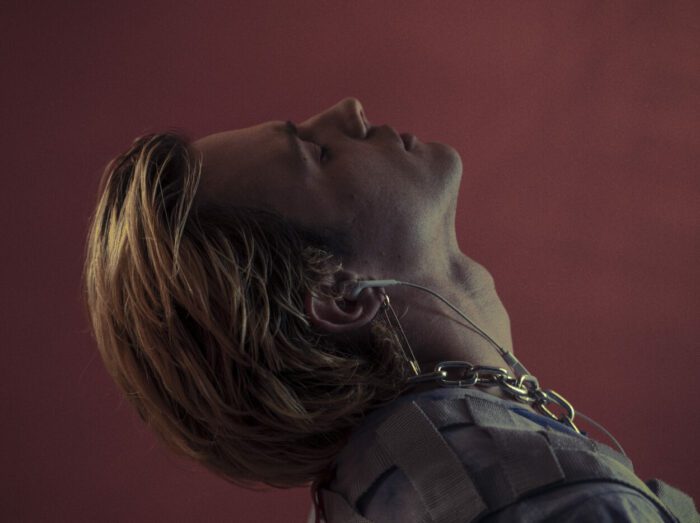
Young Diego, by the director’s own admission, is difficult to pin down. Perhaps the one thing that all viewers can agree on is that it is uncomfortable. The entire short film takes place in a small cafe and is a conversation between Diego (Iván Pellicer) and a man (Quim Ramos) whose face is never seen, but whose voice sounds like it belongs in a horror movie. What transpires over the next seven minutes is pure set-up that the audience will never see the result of. What’s left is an unsettling premise that doesn’t even try to reach its full potential before the credits roll. Young Diego ends with a quote from Francis Bacon: “Even within the most beautiful landscape, in the trees, under the leaves the insects are eating each other.” Even within Young Diego’s bare cinematography, there’s darkness beneath the surface.
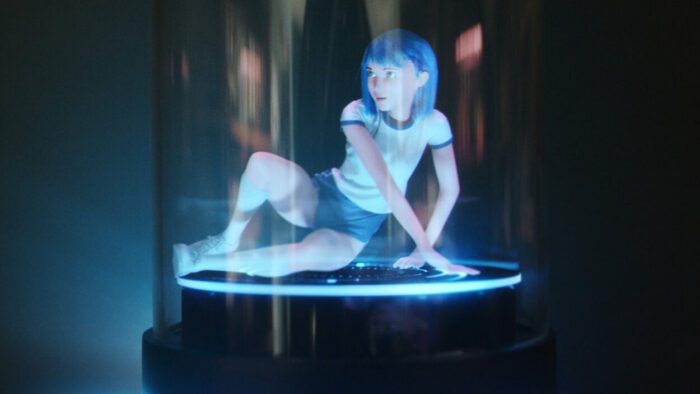
Yandere is a Japanese word meaning “lovesick.” In the world of this short film, yandere also means a small, holographic, artificially intelligent woman in a glass cylinder. Maïka (Ayumi Roux) is the name of Tommy’s (Gulliver Bevernaege-Benhadj) yandere. He treats her as if she were a real person, and the two are as inseparable as a teenage boy and a woman in a glass cylinder can be. Maïka is devastated when Tommy finds a real-life girlfriend (Armande Boulanger). This revelation causes Maïka to become sentient, and the rest is science-fiction history. Yandere could belong in the Black Mirror catalog if it had a slightly longer runtime. As artificial intelligence becomes all the more possible, stories like Yandere will start to feel less like science fiction.
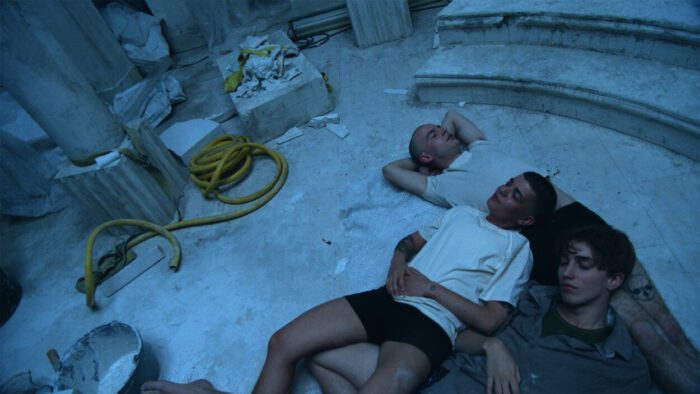
In Amfi, the director says he wants to make a film that he wishes he could have “seen when I was younger.” It’s a sentiment that comes up time and again in LGBT cinema. How does one begin to create and tell stories for themselves when they didn’t grow up seeing those possibilities on screen? Amfi is attempting to right some wrongs through introspection. The short film is about three young men (Anton Falck Gansted, Adam Hawwa Vissing, & Sigurd Holm) in an empty building. They’re strangers who are tasked with creating a sculpture of a new man—a papier-mâché cast built from casts of their own body parts. Amfi comes after two shorts that have a more science-fiction, off-kilter approach, so the sincerity of its conversations about sexuality, masculinity, and identity is disarming in the best way.
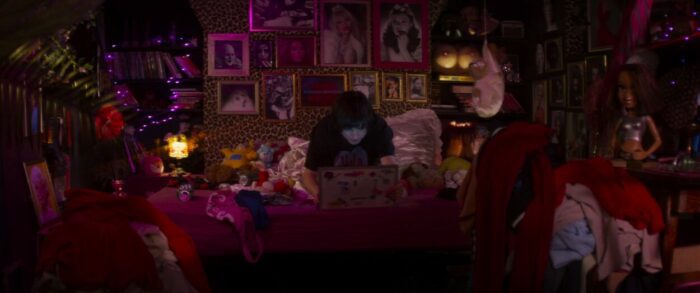
The Demons of Dorothy proudly describes itself as “glittercore.” The sheer amount of pink, glitter, and sparkles on display here makes a solid case for “glittercore” to become a widely recognized genre. Dorothy (Justine Langlois) is a twenty-something lesbian who’s desperate to make a movie, but can’t find anyone to finance her queer films. This genuine criticism of the film industry is filtered through a deranged Lisa Frank fever dream full of gore, glitter, and chaos. The production design is the film’s biggest strength, existing somewhere within the depths of John Waters’ mind. However, the film’s attempts at critiquing the experience of a woman trying to make a career in the French film industry are lost in the campiness.
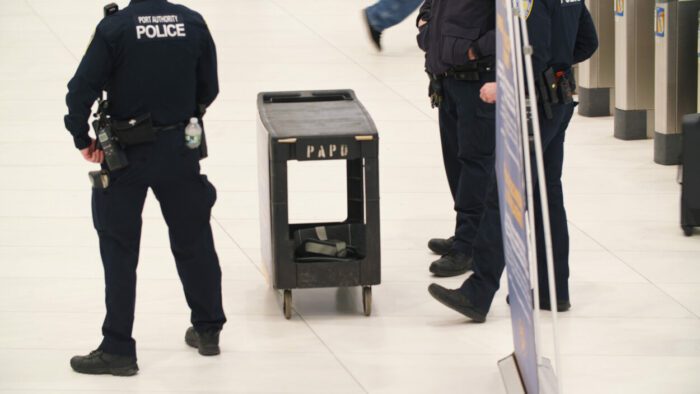
Trade Center takes a look at these famous buildings in a way that they’re not often remembered. In the 1980s and ’90s, the World Trade Center was a well-known place for gay men to cruise for sex. The men’s bathrooms on the 12th floor, the stairwell to the underground parking garage, the restroom by the PATH train, and a slew of other locations are spoken about by the short film’s participants with a sort of reverence for what New York City once was. The stories these men tell are juxtaposed with clean, modern visuals of the Freedom Tower. Trade Center is a quick look at a New York City that may never be again.
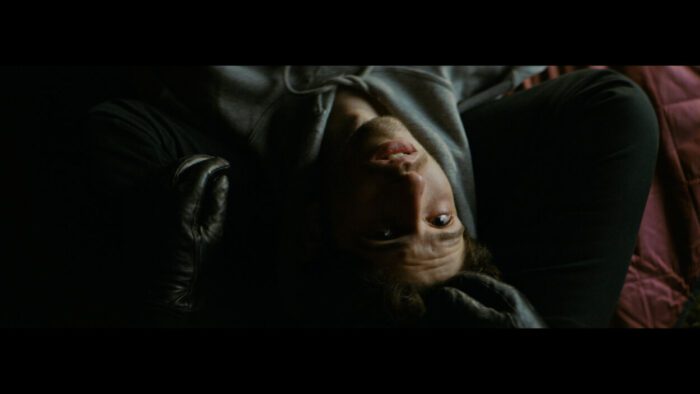
Chaperone is a two-person short. There are two men (Russell Kahn & Zachary Quinto) with no names driving somewhere. One of the men looks scared, the other wears black latex gloves and is entirely in control. Their names, where they’re from, where they’re going, and any basic information about them is never revealed, but it’s obvious they’re building toward something. While that something is revealed (and is played like a twist even though it’s fairly obviously foreshadowed), Chaperone needed at least five more minutes to really nail its themes. What’s missing is the “why” for these characters. Too much explanation can drag down a short film and make it feel entirely expositional, but Chaperone would have benefitted from a few extra moments with these characters to help the audience understand how these events came to exist.
Altered Innocence Vol. 2 is available to pre-order on Vinegar Syndrome. Available on Blu-Ray and DVD on July 25, the home release of Altered Innocence Vol. 2 features both programs of short films, totaling to almost 4 hours of films that have been featured at festivals like Toronto, Sundance, Berlin, Locarno, and others.
Check out the trailer:
“Altered” Program:
- Young Diego, directed by Osama Chami & Enrique Gimeno
- Yandere, directed by William Laboury
- Amfi, directed by Mathias Broe
- The Demons of Dorothy, directed by Alexis Langlois
- Trade Center, directed by Adam Baran
- Chaperone, directed by Sam Max
“Innocence” Program:
- Awakening, directed by Christian Tafdrup
- A Wild Patience Has Taken Me Here, directed by Érica Sarmet
- Shower Boys, directed by Christian Zetterberg
- Dustin, directed by Naïla Guiguet
- Kiem Holijanda, directed by Sarah Veltmeyer

